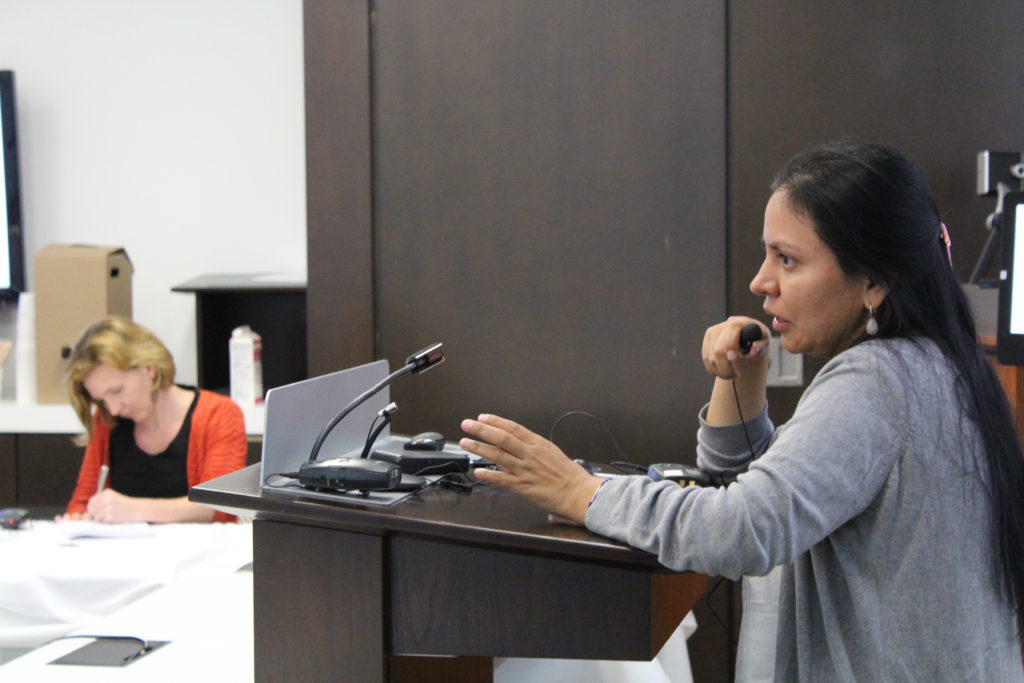
Extraction, Indigenous Rights and Prior Consent
- Patricia Tobón Yagarí Emberá indigenous activist and lawyer, National Indigenous Organization of Colombia
The Rapoport Center continued the Fall 2016 Colloquium on Natural Resource Governance, Inequality and Human Rights with a presentation by Patricia Tobón Yagarí, an Emberá indigenous attorney in Colombia, on extractive industries and indigenous rights. Tobón shared insights from her work with the National Indigenous Organization of Colombia and her recent involvement in the Colombian peace talks between the Colombian government and the FARC guerrilla forces.
Tobón began her presentation with a discussion on the laws and beliefs of indigenous peoples and the relationship and treatment of land, and the similarities of these laws to Western conceptions of sustainability. Her presentation highlighted how although there have been significant legal advances in the protection of ingenious rights, many of the extraction practices on the ground have not changed. Tobón contested the common argument made in favor of extraction of natural resources, namely that it will benefit the public, by pointing to how even the Colombian government official who oversees extractive activities has acknowledged in a report that the extractive industries in Colombia have produced almost no benefits for the people.
In her presentation, Tobón shared a map showing how the indigenous territories overlap with areas where there are existing projects or proposals for extractive industries and with areas of armed conflict. Tobón lamented that although the Colombian government has granted indigenous people special protection, abuses continue to occur. To illustrate the magnitude of the problem Tobón mentioned that there are over 870 requests to license indigenous peoples’ land for extractive purposes, and Colombia is on a path to grant nearly 50% of indigenous lands to various companies.
Tobón emphasized that the side effects of extractive industries are not limited to those that are visible. She drew on a recent report published by the National University of Colombia showing that the levels of mercury – a byproduct of many extractive processes – within indigenous peoples’ water and within indigenous mother’s breast milk were alarmingly high. She also pointed to further studies that showed dangerous levels of mercury in seafood such as tuna and shellfish, which are staples of indigenous peoples’ diets. Despite these findings, the Colombian environmental agencies have so far failed to act in a manner that would halt this pollution.
In conclusion, Tobón emphasized that there has not yet been responsible extraction in Colombia, as is evident from the damage to people’s health and the environment. She argued that reserved areas should be set aside for indigenous people so that they can farm and live independently, but without quick governmental action to protect these territories she felt there was little hope for the indigenous population.
Daniel Brinks, Associate Professor of Government and Co-Director of the Rapoport Center, responded expanding on Tobón’s discussion of how and why extractive industries often do not live up to their supposed benefits. He explored the paradox between progressive Constitutional Court decisions affirming human rights and the on the ground reality of continued destructive exploitation. Brinks suggested that this paradox represents a broader failure of the principle of free, prior and informed consent and its limited capacity to shift authority for resource governance and decision over mining to the indigenous peoples most affected. Currently, Brinks argued, the principle of FPIC is being used more as a way to clear title to land rather than as a protection for indigenous people. In a context where across Latin America extractive industries continued to be seen and pursued as an engine of growth despite mounting evidence that they can cause considerable harms, it is more important than ever to critically assess how to make rights effective and real on the ground.
Respondents
- Daniel Brinks Co-director (2010-2019); Professor of Government and of Law; Chair, Government Department
Supporters
LLILAS Benson Latin American Studies and Collections, Latin American Initiative
